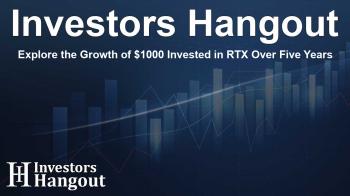Explore the Growth of $1000 Invested in RTX Over Five Years

RTX Financial Growth: A Five-Year Journey
Investing in stocks can often feel like a rollercoaster ride, but what if $1000 had been invested in RTX five years ago? This analysis showcases the impressive return on investment and the power of compounding growth in the stock market.
Performance Overview of RTX
Over the past five years, RTX has shown a remarkable resilience and growth trajectory. On an annualized basis, RTX surpassed the market by 5.31%, achieving an impressive average annual return of 19.7%. Currently, RTX boasts a market capitalization of approximately $195.25 billion, solidifying its position as a major player in the industry.
The Impact of Initial Investment
To put the performance into perspective, let's consider an investment scenario. If an investor decided to purchase $1000 worth of RTX stocks five years ago, today that amount would have ballooned to approximately $2,521.77, based on the current stock price of $146.15. This illustrates the significant gains that long-term investments can yield, making the case for a buy-and-hold strategy.
Understanding Compounded Returns
The primary takeaway here is the effect of compounded returns. Compounding works in your favor as gains accumulate over time, leading to exponential growth in your investments. This reflects a fundamental principle in investing: the longer you hold onto an investment, the more it can potentially grow.
Key Insights into RTX’s Future
Investors should remain optimistic about RTX's future prospects, given its current performance and market dynamics. As the company continues to innovate and expand its operations, there is potential for further growth. Historical performance alongside ongoing advancements makes it a stock worth monitoring.
Why Consider RTX for Your Portfolio?
For investors looking to diversify their portfolios, RTX presents an enticing option. Its solid performance metrics, market capitalization, and growth potential align with the goals of long-term investors. By incorporating such stocks, individuals can work towards a well-rounded investment strategy that capitalizes on growth opportunities.
Frequently Asked Questions
What is the average annual return of RTX?
RTX has achieved an average annual return of 19.7% over the past five years, outperforming the market by 5.31% annually.
How much would $1000 invested in RTX five years ago be worth today?
Today, a $1000 investment in RTX from five years ago would be worth approximately $2,521.77.
Why is compounded return important in investing?
Compounded returns illustrate how investments grow exponentially over time, making it crucial for long-term investment strategies.
What is RTX's current market capitalization?
RTX's current market capitalization is about $195.25 billion, showcasing its substantial size and market presence.
Should I consider RTX for diversifying my investment portfolio?
Yes, RTX may be a great addition to diversify your portfolio, given its solid performance and positive growth prospects in the market.
About The Author
Contact Dylan Bailey privately here. Or send an email with ATTN: Dylan Bailey as the subject to contact@investorshangout.com.
About Investors Hangout
Investors Hangout is a leading online stock forum for financial discussion and learning, offering a wide range of free tools and resources. It draws in traders of all levels, who exchange market knowledge, investigate trading tactics, and keep an eye on industry developments in real time. Featuring financial articles, stock message boards, quotes, charts, company profiles, and live news updates. Through cooperative learning and a wealth of informational resources, it helps users from novices creating their first portfolios to experts honing their techniques. Join Investors Hangout today: https://investorshangout.com/
The content of this article is based on factual, publicly available information and does not represent legal, financial, or investment advice. Investors Hangout does not offer financial advice, and the author is not a licensed financial advisor. Consult a qualified advisor before making any financial or investment decisions based on this article. This article should not be considered advice to purchase, sell, or hold any securities or other investments. If any of the material provided here is inaccurate, please contact us for corrections.

